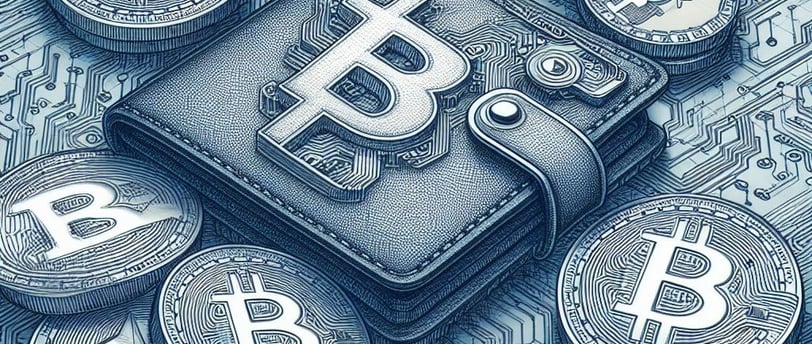Why Are Cold Wallets Essential for Cryptocurrency Security?
Uncover the importance of cold wallets in safeguarding your digital assets from cyber threats. Learn about the different types of cold storage options, including hardware and paper wallets, and how they provide an added layer of security by keeping your private keys offline. Discover the key considerations for choosing the right cold wallet to enhance the security and peace of mind for your cryptocurrency investments.


In the world of digital currency, security is paramount. With the increasing popularity and value of cryptocurrencies, it's crucial to protect your digital assets from cyber threats. One of the most secure ways to store your cryptocurrency is through the use of cold wallets.
What are Cold Wallets?
Cold wallets, also known as cold storage, are devices or methods that keep your cryptocurrency offline, away from the internet. Unlike hot wallets, which are connected to the internet and vulnerable to hacks, cold wallets provide an added layer of security by keeping your private keys offline.
Private keys are essential for accessing and managing your cryptocurrency. They are like a password that gives you control over your digital assets. By storing your private keys offline, cold wallets protect your cryptocurrency from potential cyber attacks, such as hacking or phishing attempts.
Types of Cold Storage Options
There are several types of cold storage options available, each with its own features and benefits. Let's explore the two most common types: hardware wallets and paper wallets.
Hardware Wallets
A hardware wallet is a physical device designed specifically for storing cryptocurrency securely. It resembles a USB drive and is equipped with its own screen and buttons for easy navigation. Hardware wallets offer a high level of security by keeping your private keys offline and providing an extra layer of protection against malware or computer viruses.
When using a hardware wallet, your private keys never leave the device. Transactions are signed within the device itself, ensuring that your sensitive information is never exposed to potential threats. Some popular hardware wallet brands include Ledger, Trezor, and KeepKey.
Hardware wallets are user-friendly and suitable for both beginners and experienced cryptocurrency investors. They often come with companion software that makes it easy to manage your digital assets and track your transactions. Additionally, hardware wallets support multiple cryptocurrencies, allowing you to store various coins in one secure device.
Paper Wallets
A paper wallet is a physical printout of your cryptocurrency's public and private keys. It is generated offline and can be stored in a safe place, such as a vault or a secure location in your home. Paper wallets are considered one of the most secure methods of cold storage as they are not susceptible to online attacks.
To create a paper wallet, you can use online services or generate one offline using open-source software. The process involves creating a new wallet address, generating the public and private keys, and printing them onto a physical piece of paper. It's important to note that once a paper wallet is generated, it is crucial to keep it secure and prevent unauthorized access.
While paper wallets offer a high level of security, they can be less user-friendly compared to hardware wallets. They require manual entry of the private key when you want to access your cryptocurrency, which can be cumbersome and prone to human error. Additionally, paper wallets are typically designed for a single cryptocurrency, limiting their versatility.
Choosing the Right Cold Wallet
When choosing a cold wallet, it's essential to consider your specific needs and preferences. Here are some factors to consider:
Security:
The primary reason for using a cold wallet is to enhance the security of your digital assets. Look for wallets that offer robust security features, such as strong encryption, two-factor authentication, and PIN protection. Additionally, consider the reputation and track record of the wallet provider to ensure their commitment to security.
Compatibility:
Ensure that the cold wallet you choose is compatible with the cryptocurrencies you own or plan to invest in. Different wallets support different coins, so it's important to check if your desired cryptocurrencies are supported.
User-Friendliness:
Consider the ease of use and user interface of the cold wallet. Some wallets have intuitive interfaces and companion apps that make it easy to manage your digital assets, while others may have a steeper learning curve. Choose a wallet that aligns with your level of technical expertise.
Additional Features:
Some cold wallets offer additional features, such as integration with popular cryptocurrency exchanges or the ability to stake certain coins. These features can add convenience and flexibility to your cryptocurrency management. Consider whether these additional features are important to you.
Enhancing Security and Peace of Mind
Implementing a cold wallet as part of your cryptocurrency storage strategy can greatly enhance the security of your digital assets. By keeping your private keys offline, you significantly reduce the risk of cyber attacks and hacking attempts. This added layer of protection provides peace of mind, especially in the volatile world of digital currency.
Remember to keep your cold wallet and backup copies of your private keys in a safe and secure location. Consider using a physical vault or a secure safe to protect your assets from physical threats, such as theft or damage.
In conclusion, cold wallets offer a secure and reliable way to store your digital assets. Whether you choose a hardware wallet or a paper wallet, the key is to keep your private keys offline and away from potential cyber threats. By taking the necessary precautions and choosing the right cold wallet for your needs, you can have peace of mind knowing that your cryptocurrency is safe and secure.
